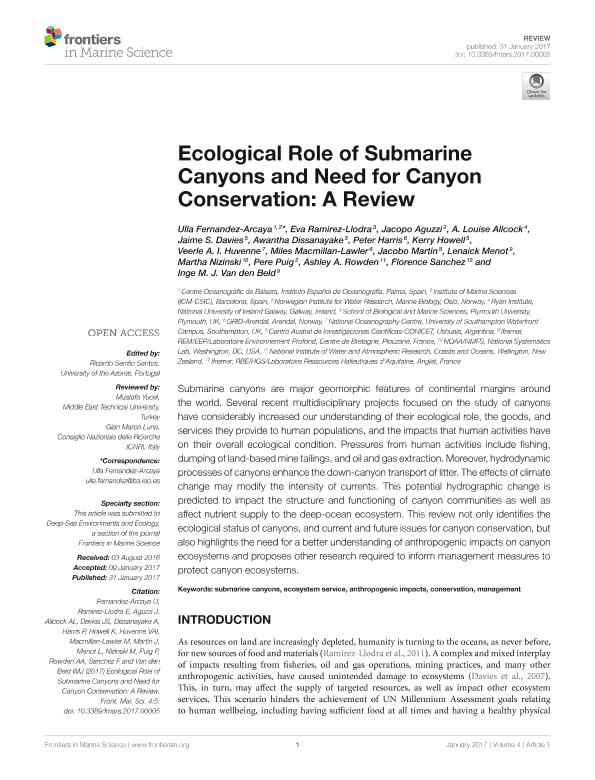Mostrar el registro sencillo del ítem
dc.contributor.author
Fernandez Arcaya, Ulla
dc.contributor.author
Ramirez Llodra, Eva
dc.contributor.author
Aguzzi, Jacopo
dc.contributor.author
Allcock, A. Louise
dc.contributor.author
Davies, Jaime S.
dc.contributor.author
Dissanayake, Awanta
dc.contributor.author
Harris, Peter
dc.contributor.author
Howell, Kerry
dc.contributor.author
Huvenne, Veerle A. I.
dc.contributor.author
Macmillan Lawler, Miles
dc.contributor.author
Martín de Nascimento, Jacobo

dc.contributor.author
Menot, Lenaick
dc.contributor.author
Nizinski, Martha
dc.contributor.author
Puig, Pere
dc.contributor.author
Rowden, Ashley A.
dc.contributor.author
Sanchez, Florence
dc.contributor.author
Van den Beld, Inge M. J.
dc.date.available
2018-11-02T20:03:30Z
dc.date.issued
2017-02
dc.identifier.citation
Fernandez Arcaya, Ulla; Ramirez Llodra, Eva; Aguzzi, Jacopo; Allcock, A. Louise; Davies, Jaime S.; et al.; Ecological role of submarine canyons and need for canyon conservation: a review; Frontiers Research Foundation; Frontiers in Marine Science; 4; 5; 2-2017; 1-26
dc.identifier.issn
2296-7745
dc.identifier.uri
http://hdl.handle.net/11336/63548
dc.description.abstract
Submarine canyons are major geomorphic features of continental margins around the world. Several recent multidisciplinary projects focused on the study of canyons have considerably increased our understanding of their ecological role, the goods, and services they provide to human populations, and the impacts that human activities have on their overall ecological condition. Pressures from human activities include fishing, dumping of land-based mine tailings, and oil and gas extraction. Moreover, hydrodynamic processes of canyons enhance the down-canyon transport of litter. The effects of climate change may modify the intensity of currents. This potential hydrographic change is predicted to impact the structure and functioning of canyon communities as well as affect nutrient supply to the deep-ocean ecosystem. This review not only identifies the ecological status of canyons, and current and future issues for canyon conservation, but also highlights the need for a better understanding of anthropogenic impacts on canyon ecosystems and proposes other research required to inform management measures to protect canyon ecosystems.
dc.format
application/pdf
dc.language.iso
eng
dc.publisher
Frontiers Research Foundation

dc.rights
info:eu-repo/semantics/openAccess
dc.rights.uri
https://creativecommons.org/licenses/by-nc-sa/2.5/ar/
dc.subject
Anthropogenic Impacts
dc.subject
Conservation
dc.subject
Ecosystem Service
dc.subject
Management
dc.subject
Submarine Canyons
dc.subject.classification
Meteorología y Ciencias Atmosféricas

dc.subject.classification
Ciencias de la Tierra y relacionadas con el Medio Ambiente

dc.subject.classification
CIENCIAS NATURALES Y EXACTAS

dc.title
Ecological role of submarine canyons and need for canyon conservation: a review
dc.type
info:eu-repo/semantics/article
dc.type
info:ar-repo/semantics/artículo
dc.type
info:eu-repo/semantics/publishedVersion
dc.date.updated
2018-10-19T15:06:50Z
dc.journal.volume
4
dc.journal.number
5
dc.journal.pagination
1-26
dc.journal.pais
Suiza

dc.journal.ciudad
Lausanne
dc.description.fil
Fil: Fernandez Arcaya, Ulla. Instituto Espanol de Oceanografia; . Consejo Superior de Investigaciones Científicas. Instituto de Ciencias del Mar; España
dc.description.fil
Fil: Ramirez Llodra, Eva. Norsk Institutt For Vannforskning; Noruega
dc.description.fil
Fil: Aguzzi, Jacopo. Consejo Superior de Investigaciones Científicas. Instituto de Ciencias del Mar; España
dc.description.fil
Fil: Allcock, A. Louise. National University Of Ireland Galway; Irlanda
dc.description.fil
Fil: Davies, Jaime S.. Plymouth University. School of biological and Marine Sciences; Reino Unido
dc.description.fil
Fil: Dissanayake, Awanta. Plymouth University. School of biological and Marine Sciences; Reino Unido
dc.description.fil
Fil: Harris, Peter. GRID-Arendal; Noruega
dc.description.fil
Fil: Howell, Kerry. Plymouth University. School of biological and Marine Sciences; Noruega
dc.description.fil
Fil: Huvenne, Veerle A. I.. University of Southampton. National Oceanography Centre. Waterfront Campus; Reino Unido
dc.description.fil
Fil: Macmillan Lawler, Miles. GRID-Arendal; Noruega
dc.description.fil
Fil: Martín de Nascimento, Jacobo. Consejo Nacional de Investigaciones Científicas y Técnicas. Centro Austral de Investigaciones Científicas; Argentina
dc.description.fil
Fil: Menot, Lenaick. Ifremer. REM/EEP/Laboratoire Environnement Profond; Francia
dc.description.fil
Fil: Nizinski, Martha. NOAA/NMFS. National Systematics Lab.; Estados Unidos
dc.description.fil
Fil: Puig, Pere. Consejo Superior de Investigaciones Científicas. Instituto de Ciencias del Mar; España
dc.description.fil
Fil: Rowden, Ashley A.. National Institute Of Water And Atmospheric Research; Nueva Zelanda
dc.description.fil
Fil: Sanchez, Florence. Ifremer, RBE/HGS/Laboratoire Ressources Halieutiques d'Aquitaine; España
dc.description.fil
Fil: Van den Beld, Inge M. J.. Ifremer. REM/EEP/Laboratoire Environnement Profond; Francia
dc.journal.title
Frontiers in Marine Science
dc.relation.alternativeid
info:eu-repo/semantics/altIdentifier/doi/https://doi.org/10.3389/fmars.2017.00005
dc.relation.alternativeid
info:eu-repo/semantics/altIdentifier/url/https://www.frontiersin.org/articles/10.3389/fmars.2017.00005/full
Archivos asociados
